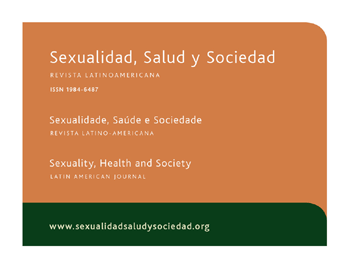EDITORIAL
This issue of Sexuality, Health and Society Latin American Journal explores a wide range of subjects and problems. We start by highlighting two articles for their careful critical analyses of particularly loaded notions deployed in contemporary debates on sexual abuse of children and adolescents, and on the legalization of abortion in our Region.
The pieceby José Morán Faúndes and María Angélica Peñas Defago tracks a genealogy of the notion of "life". The authors explore the political character that that concept takes on at the height of the ethical and social disputes that continue demarcating the Latin American landscape, despite the growing recognition of sexual and reproductive rights. Against the grain of "truth" claims, especially those invoked by the Catholic Church, the authors debunk the supposedly objective, neutral, and universal nature of a notion of "life" which, presented as scientific, renders women invisible as subjects of rights.
Based on the proceedings of the Parliamentary Inquiry Commission on Pedophilia installed by the Brazilian Senate in 2008, and on her own ethnographic fieldwork with the Federal Police in Rio de Janeiro, Laura Lowenkron engages the notions of "pedophilia" deployed to combat sexual violence against children and adolescents. She discusses an effect that she calls "representational realism," a causal relation between fantasy, representation, and action, taken for granted in political and juridical discourses on child pornography on the internet.
Another common thread connecting the articles in this issue is the analytical challenge of taking up different empirical contexts with the tools of the approach conventionally designated as intersectional. In his research with upper class gay men in the city of São Paulo, Marcio Zamboni looks at how certain social markers of difference (class, gender, race, and generation) are reorganized in the production of a specific form of representation (the artistic nude).The author shows the way certain social differences configure that type of representation or scene, locating observers (artists) and their models at particular positions within multipleinter connected social hierarchies.
In the same direction, the piece by Marina Tomasini addresses everyday practices in which gender and generation differences and oppositions are (re)produced among lower class young male students in the city of Cordoba, Argentina. By looking at the act of" playing mean", the author explores the meaning of violent manifestations between classmates to understand how relations among youths in the context of early secondary school (re)create wider social systems of classification involving class and gender cleavages.
Daniel Kerry dos Santos and Mara Lago note the diversity and complexity of experiences o faging narrated by men who have erotic practices with other men, who participated in their research in the city of Florianopolis, Brazil. The narratives they collected suggest various ethical, aesthetic, and stylistic possibilities among different ways of aging, which exceed the narrow boundaries commonly attributed to "older homosexuals."
Finally in this issue, Sexuality, Health and Society offers to its Latin American readership a Portuguese version of an important article by the North American sociologist Janice Irvine, especially released by the author and her editors. The piece, originally published in 1993, traces the relatively recent creation of two then new diagnostic categories for so-called sexual disorders, "inhibited sexual desire," and "sexual addiction." Irvine's article, which brought a fundamental contribution to the understanding of contemporary sexual regulation, serves as companion to the dossier on Medicalization, Sexuality, and Gender included in our past issue #14.
Publication Dates
-
Publication in this collection
10 Jan 2014 -
Date of issue
Dec 2013

